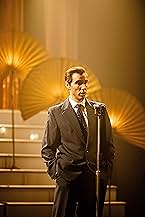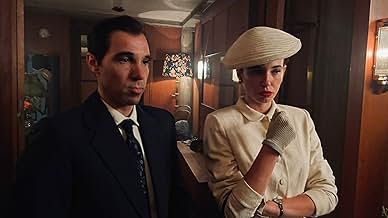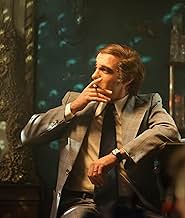AVALIAÇÃO DA IMDb
7,3/10
3,2 mil
SUA AVALIAÇÃO
Acompanha o início da trajetória do icônico cantor, compositor e ator franco-armênio, Charles Aznavour, do zero à fama.Acompanha o início da trajetória do icônico cantor, compositor e ator franco-armênio, Charles Aznavour, do zero à fama.Acompanha o início da trajetória do icônico cantor, compositor e ator franco-armênio, Charles Aznavour, do zero à fama.
- Direção
- Roteiristas
- Artistas
- Prêmios
- 4 indicações no total
Nicolas Chupin
- Jean-Louis Marquet
- (as Nicolas Chupin de la Comédie Française)
- Direção
- Roteiristas
- Elenco e equipe completos
- Produção, bilheteria e muito mais no IMDbPro
Avaliações em destaque
To be honest, I did not really know what to expect from this movie. Of course I have heard from Charles Aznavour and know a bit about his background, but his songs sometimes seemed too theatrical. So, unbiassed, I went to see the movie. It was absolutely beautiful, rich in details, very close attention to different time frames during which the movie was set (e.g. The clothing) and the acting simply is very good. Now understanding the often personal background to Aznavour's songs, I came to appreciate them even more. The end was chosen carefully (no spoiler!) and moved me - together with most of the audience - to tears. Go see it, it is a gem!
Musical biopics seem to be one of the most prolific film genres of recent years. 'Monsieur Aznavour' had the premises of a special case, as it is a film whose conception started while Charles Aznavour was still alive. He himself chose the two filmmakers - screenwriters and directors - Mehdi Idir and Grand Corps Malade - and granted them access to his personal archives and in his residences for discussions with him and his family. Aznavour died in 2018, when the film was in pre-production. The two filmmakers let a few years pass before resuming the work at the film, releasing it in 2024, when 100 years since the singer's birth were celebrated. We cannot know how the film would have looked if it had been made when Aznavour was still alive, but it is hard to imagine that it could have been more respectful and reverential in its attitude towards the musician's biography. 'Monsieur Aznavour' is a classic-style biopic, more a docu-drama rather than an artistic interpretation from a different perspective of the artist's life and work.
The script is conceived as a classic biography, almost in documentary style. We first see the little Aznavourian as an 8-year-old boy, living with his family of Armenian refugees following the genocide during the First World War, the difficult years of adaptation and integration in France in the interwar period. With the help of his classic good family (father, mother and his sister Aïda who was his best friend and confidant throughout his life, or in any case throughout the film), the child and then the young man will get through the difficult periods of war and occupation and begin a career as a musician, becoming Aznavour. The change and true launch will occur with the meeting with Édith Piaf, who will make of him her personal driver, favorite composer and the singer who appears as a 'warm-up' at the opening of concerts. The true independent career will only begin when he leaves the tutelage of the great star, who did not believe or did not want to believe in his future as a singer. The road was not easy, some decisions were not optimal, but in the end Aznavour gets where he wanted to, achieving glory and success with the public. The film depicts several key moments in the artist's biography, including famous encounters with personalities such as Johnny Hallyday or Frank Sinatra, his role in Truffaut's film 'Tirez sur le pianiste' or episodes from his private life. The price paid on a personal level was huge. When he had to choose between career and personal life, the former took priority, and the price was paid not only by him but also by those around him.
The script divides Aznavour's life and career into five chapters, with the first three, which describe his difficult youth, his launch, his rise, his crises and the beginning of his success, taking on the greatest importance and occupying most of the screening time. Some aspects of his personal life are ignored (the second of his three marriages is not mentioned at all) or treated rather superficially. In my opinion, the casting of Tahar Rahim in the lead role was not that inspired. He is a talented actor, but with a very different profile. He looks excellent, for example, in the series 'The Serpent', but here I don't think he managed to portray the complexity of this highly talented artist, workaholic, permanently dissatisfied with himself, overcoming shyness with bravery. In addition, sorry, he is too tall for the role. Aznavour's height (1.60m) was part of his personal complexes, he compensated for his anti-male model physiognomy with charisma and warmth. These are precisely what Tahar Rahim lacks, in my opinion. An interesting casting is that of Marie-Julie Baup as Édith Piaf, a very difficult role to play after seeing the film with Marion Cotillard. I liked her acting, same for Camille Moutawakil in the role of Aïda. From time to time, documentary sequences are inserted into the film, short excerpts from what Aznavour filmed on his travels with his amateur camera (another hobby of his) and only at the end we enjoyed original music. Most of the songs are performed by actors, and it is hard to avoid, for those who know and love the voices of Aznavour or Piaf, the unfavorable comparisons. The film was made with many good intentions and looks good. Due to the history of this production, 'Monsieur Aznavour' is probably the most detailed and historically accurate biographical film that will ever be made about Charles Aznavour. But that may not be enough for a very good biographical film. It lacks an original perspective, it lacks the passion and intense artistic and emotional experience that I had every time I saw and heard Aznavour sing. I hope there will be better films about him. Charles Aznavour deserves it.
The script is conceived as a classic biography, almost in documentary style. We first see the little Aznavourian as an 8-year-old boy, living with his family of Armenian refugees following the genocide during the First World War, the difficult years of adaptation and integration in France in the interwar period. With the help of his classic good family (father, mother and his sister Aïda who was his best friend and confidant throughout his life, or in any case throughout the film), the child and then the young man will get through the difficult periods of war and occupation and begin a career as a musician, becoming Aznavour. The change and true launch will occur with the meeting with Édith Piaf, who will make of him her personal driver, favorite composer and the singer who appears as a 'warm-up' at the opening of concerts. The true independent career will only begin when he leaves the tutelage of the great star, who did not believe or did not want to believe in his future as a singer. The road was not easy, some decisions were not optimal, but in the end Aznavour gets where he wanted to, achieving glory and success with the public. The film depicts several key moments in the artist's biography, including famous encounters with personalities such as Johnny Hallyday or Frank Sinatra, his role in Truffaut's film 'Tirez sur le pianiste' or episodes from his private life. The price paid on a personal level was huge. When he had to choose between career and personal life, the former took priority, and the price was paid not only by him but also by those around him.
The script divides Aznavour's life and career into five chapters, with the first three, which describe his difficult youth, his launch, his rise, his crises and the beginning of his success, taking on the greatest importance and occupying most of the screening time. Some aspects of his personal life are ignored (the second of his three marriages is not mentioned at all) or treated rather superficially. In my opinion, the casting of Tahar Rahim in the lead role was not that inspired. He is a talented actor, but with a very different profile. He looks excellent, for example, in the series 'The Serpent', but here I don't think he managed to portray the complexity of this highly talented artist, workaholic, permanently dissatisfied with himself, overcoming shyness with bravery. In addition, sorry, he is too tall for the role. Aznavour's height (1.60m) was part of his personal complexes, he compensated for his anti-male model physiognomy with charisma and warmth. These are precisely what Tahar Rahim lacks, in my opinion. An interesting casting is that of Marie-Julie Baup as Édith Piaf, a very difficult role to play after seeing the film with Marion Cotillard. I liked her acting, same for Camille Moutawakil in the role of Aïda. From time to time, documentary sequences are inserted into the film, short excerpts from what Aznavour filmed on his travels with his amateur camera (another hobby of his) and only at the end we enjoyed original music. Most of the songs are performed by actors, and it is hard to avoid, for those who know and love the voices of Aznavour or Piaf, the unfavorable comparisons. The film was made with many good intentions and looks good. Due to the history of this production, 'Monsieur Aznavour' is probably the most detailed and historically accurate biographical film that will ever be made about Charles Aznavour. But that may not be enough for a very good biographical film. It lacks an original perspective, it lacks the passion and intense artistic and emotional experience that I had every time I saw and heard Aznavour sing. I hope there will be better films about him. Charles Aznavour deserves it.
Bravo to Tahar Rahim! I've always believed that a great film starts with an outstanding actor, and Rahim exceeds all expectations. Who could have imagined that his resemblance to Charles Aznavour would be so striking? Having seen Aznavour perform live in the past, I was amazed at how perfectly Rahim captured not only his appearance but also his signature mannerisms. It felt like Aznavour himself was brought back to life on screen!
Another fascinating aspect of the film is its vivid portrayal of 20th-century Paris, where we get glimpses of other iconic figures like Edith Piaf. It immerses you in that glamorous era, bringing the lives of these legends to the forefront.
The cinematography is nothing short of breathtaking-precisely executed and visually captivating, it keeps you engaged from start to finish. Directors Grand Corps Malade and Mehdi Idir have truly crafted a masterpiece, recreating Aznavour's life with remarkable authenticity.
This is a film you won't want to miss-it's an unforgettable experience that you'll be glad you watched!
Another fascinating aspect of the film is its vivid portrayal of 20th-century Paris, where we get glimpses of other iconic figures like Edith Piaf. It immerses you in that glamorous era, bringing the lives of these legends to the forefront.
The cinematography is nothing short of breathtaking-precisely executed and visually captivating, it keeps you engaged from start to finish. Directors Grand Corps Malade and Mehdi Idir have truly crafted a masterpiece, recreating Aznavour's life with remarkable authenticity.
This is a film you won't want to miss-it's an unforgettable experience that you'll be glad you watched!
Great movie, well made, the story is very well presented and the cast is fantastic, it was a really emotional movie.
The story shows the life of a famous composer, singer, musician Charles Aznavour. There was a bit of everything, from his family life, his relations with famous singers and composers to his personal career going all the way to New York.
I was very impressed with the cinematic elements of the film, the angles, the colours, the effects, the director definitely knew what he was doing.
I would like to recommend this movie to everyone who likes the french "chanson" and the french culture!
Bon lecture!
The story shows the life of a famous composer, singer, musician Charles Aznavour. There was a bit of everything, from his family life, his relations with famous singers and composers to his personal career going all the way to New York.
I was very impressed with the cinematic elements of the film, the angles, the colours, the effects, the director definitely knew what he was doing.
I would like to recommend this movie to everyone who likes the french "chanson" and the french culture!
Bon lecture!
This was my first encounter with Charles Aznavour - a really important iconic figure and symbol of France. The story is very compelling and what a hard life he had before his breakthrough. One fact really surprised me - the song "What's the Difference" - Dr. Dre feat. Eminem and Xzibit was inspired by and contains a horn section in the instrumental, as well as a sample of "Parce Que Tu Crois" by Charles Aznavour.
The movie shows so many aspects and questions that are universal to human beings. What is the price of fame? Where is the line between working all the time and spending time with family? The constant drive of an artistic spirit to always do more and the feeling of never enough.
The movie shows so many aspects and questions that are universal to human beings. What is the price of fame? Where is the line between working all the time and spending time with family? The constant drive of an artistic spirit to always do more and the feeling of never enough.
Você sabia?
- CuriosidadesTahar Rahim performed his own singing for the movie. Before shooting, he took singing lessons, piano lessons and posturing lessons for months to mimic Charles Aznavour's voice and body language.
- ConexõesReferences Atirem no Pianista (1960)
- Trilhas sonorasLa Bohème
Music by Charles Aznavour
Lyrics by Jacques Plante
Performed by Charles Aznavour and Tahar Rahim
Principais escolhas
Faça login para avaliar e ver a lista de recomendações personalizadas
- How long is Monsieur Aznavour?Fornecido pela Alexa
Detalhes
Bilheteria
- Orçamento
- € 26.000.000 (estimativa)
- Faturamento bruto mundial
- US$ 16.140.731
- Tempo de duração
- 2 h 13 min(133 min)
- Cor
- Proporção
- 2.35 : 1
Contribua para esta página
Sugerir uma alteração ou adicionar conteúdo ausente
























